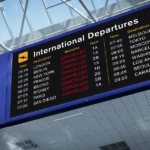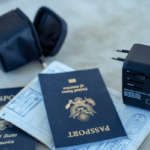Traveling through France offers an enchanting experience, but it’s crucial to stay prepared for any emergencies. This guide aims to equip you with essential safety tips and important numbers, ensuring your journey is not just memorable but also secure. Embracing the “France Emergency Guide” will make your adventure through this beautiful country worry-free, allowing you to explore its wonders with peace of mind.
Introduction to Staying Safe in France

In the charm of France, safety might not be your first thought. Yet, being prepared is key to a seamless experience. France’s allure, from Parisian streets to Riviera beaches, is undisputed. However, emergencies don’t schedule appointments. Understanding this, we delve into the heart of staying safe. Here, we’ll explore the critical aspects of navigating unexpected situations while soaking in the French culture.
The importance of knowing the right contacts cannot be overstated. In any emergency, time is of essence. Familiarizing yourself with local emergency numbers is your first step towards safety. But it’s not just about having numbers on hand. It’s about knowing when and how to use them. This knowledge becomes your shield, allowing you to react swiftly and efficiently, whether it’s a health scare, a lost passport, or any unforeseen event.
Moreover, embracing the “France Emergency Guide” enriches your travel experience. It’s not merely about responding to crises; it’s about preventive understanding. Knowing what to expect and how to prepare can transform your approach to travel safety. This proactive stance ensures that your French adventure is marked by joy and discovery, rather than distress. Let’s journey through this guide, making every moment in France safe and unforgettable.
The Essential France Emergency Guide

Embarking on your French journey, the cornerstone of preparation lies in knowing the essentials. The “France Emergency Guide” is not just a list; it’s a roadmap to safety. Starting with the basics, always carry a copy of your passport and important contacts. Moreover, understanding local laws and customs provides a solid foundation. This guide is your first step towards a carefree exploration of France’s beauty and heritage.
Transitioning from preparation to action, the guide emphasizes the importance of familiarizing yourself with emergency numbers. For instance, 112 is the pan-European emergency number, offering access to all types of services. Additionally, knowing the numbers for local police, medical services, and embassies can make all the difference. Armed with this knowledge, you’re not just a traveler; you’re a well-prepared explorer of French culture and landscapes.
Finally, incorporating the “France Emergency Guide” into your travel plans means embracing a mindset of readiness. It’s about being aware of your surroundings, understanding potential risks, and knowing how to mitigate them. This approach doesn’t just apply to emergencies; it enhances your overall travel experience. By being prepared, you can navigate France’s wonders with confidence, making every moment not just safe but truly enriching.
Dialing Into Safety: Important Numbers You Must Know
Entering France, the excitement is palpable. Yet, amidst this excitement, dialing into safety is crucial. Important numbers are your lifelines in unexpected situations. Firstly, familiarize yourself with 112, the universal emergency number in France. This single number connects you to medical, fire, and police assistance. By having this number at your fingertips, you ensure a layer of security that accompanies you throughout your French adventure.
Next, expand your safety net by including other critical contacts in your phone. The local police, nearest hospital, and your country’s embassy number are indispensable. Each serves a unique purpose, from reporting a crime to seeking medical attention or consulate assistance. This knowledge empowers you, turning potential challenges into manageable situations. With these numbers saved, you’re not just prepared; you’re protected against the unforeseen.
Moreover, integrating these important numbers into your travel planning marks a proactive approach to safety. Beyond emergency services, consider adding local taxi services and 24-hour helplines for lost credit cards. This comprehensive list ensures you’re equipped for any scenario. Remember, being prepared with these contacts isn’t just about responding to emergencies; it’s about ensuring peace of mind, allowing you to immerse fully in the joys of French culture.
Health Emergencies: What To Do and Who To Call
When it comes to health emergencies in France, knowing the right steps can be life-saving. Initially, assess the situation calmly to determine if you need immediate medical assistance. For urgent medical help, dialing 112 connects you directly to emergency services, providing access to ambulance services. This prompt action can make a significant difference in outcomes, emphasizing the importance of a quick and informed response.
Furthermore, for non-life-threatening medical issues, understanding the local healthcare system is beneficial. Pharmacies in France are well-equipped to provide first aid advice and minor ailment treatments. For more specific medical concerns, contacting SOS Médecins, a service offering doctor house calls, can be a practical solution. This approach ensures that you receive timely medical advice and care, minimizing disruption to your travel plans while ensuring your health is prioritized.
Lastly, always carry your travel insurance information and a list of any medications you’re taking. In case of a visit to a hospital or clinic, having these details readily available streamlines the process. It also ensures that you can communicate effectively with healthcare professionals, even if there’s a language barrier. Preparedness in health emergencies not only safeguards your well-being but also contributes to a more secure and enjoyable travel experience in France.
Lost or Stolen Property: Steps to Recovery
Navigating the unfortunate event of lost or stolen property in France requires a calm and methodical approach. Initially, retracing your steps may help in recovering lost items. For stolen property, reporting the incident to the local police is essential. This not only formalizes the theft but also is crucial for insurance claims. Providing a detailed description of the missing items can significantly aid in their recovery.
Furthermore, contacting your embassy can be a beneficial step, especially if important documents like your passport are involved. Embassies can guide you through the process of obtaining emergency travel documents, ensuring you remain safe and legally able to travel. Additionally, reaching out to lost and found services in the area may yield positive results. This dual approach maximizes the chances of retrieving your belongings, offering a beacon of hope amidst the stress of loss.
Lastly, prevention plays a key role in safeguarding your possessions. Utilizing anti-theft bags and keeping digital copies of important documents are proactive measures that can mitigate the impact of theft. While the loss of property can be distressing, adopting these steps ensures a level of preparedness. This not only helps in dealing with the immediate aftermath but also in minimizing future risks, allowing you to continue enjoying the beauty and culture of France with peace of mind.
Natural Disasters in France: Preparedness and Response
France, with its diverse landscapes, occasionally faces natural disasters such as floods, storms, and heatwaves. Awareness and preparation are key to navigating these events safely. Initially, staying informed through local news and weather apps is crucial. These sources provide timely updates and advisories, allowing you to take necessary precautions. Understanding the local emergency plans and evacuation routes also enhances your readiness, ensuring you can respond swiftly if needed.
Furthermore, assembling an emergency kit is a proactive step towards preparedness. This kit should include basic supplies such as water, non-perishable food, a flashlight, and first-aid items. Additionally, having copies of important documents and emergency contact numbers at hand is advisable. This preparation not only aids in immediate response but also in the recovery phase following a disaster, minimizing the impact on your travel experience.
Lastly, familiarizing yourself with the French government’s guidelines for disaster response can be invaluable. These guidelines offer specific actions for different types of natural disasters, ensuring you know how to protect yourself and others. By adopting these preparedness measures, you can enjoy France’s beauty with confidence, knowing you are equipped to handle any natural challenges that may arise.
Tips for Solo Travelers: Ensuring Your Safety
Solo travel in France offers an unparalleled sense of freedom, but it also requires extra vigilance regarding safety. Initially, always inform someone of your itinerary, whether it’s a friend back home or your accommodation provider in France. This simple step ensures someone is always aware of your whereabouts, providing a safety net should you encounter any issues.
Moreover, blending in with the local crowd can significantly enhance your safety as a solo traveler. Avoiding overtly tourist behaviors and dressing similarly to the locals minimizes unwanted attention. Additionally, staying aware of your surroundings and trusting your instincts can help you avoid potentially unsafe situations. These habits are crucial in maintaining your safety while exploring the rich culture and stunning landscapes France has to offer.
Lastly, leveraging technology can be a game-changer for solo travelers. Utilizing GPS apps to navigate, translating tools to overcome language barriers, and having emergency numbers saved on your phone are all wise practices. This technological support, combined with common sense and awareness, empowers you to enjoy the wonders of France confidently and securely.
Navigating Legal Assistance: Contacts and Advice
Navigating legal issues in a foreign country can be daunting, especially in the face of emergencies. Initially, familiarizing yourself with basic French laws and regulations can prevent unintended legal troubles. For more complex issues, knowing how to access legal assistance is crucial. Legal aid in France is available, but having the contact information for English-speaking lawyers or your embassy can provide a crucial safety net.
Furthermore, in situations requiring legal intervention, documenting everything is vital. This includes reporting incidents to the police and keeping records of any communications and transactions. Such documentation can be invaluable, whether dealing with theft, accidents, or disputes. Additionally, your embassy can offer guidance and support, acting as a liaison to navigate France’s legal system more smoothly.
Lastly, considering travel insurance that covers legal assistance can offer peace of mind. This coverage can be a lifesaver in situations that escalate legally. It’s not just about having a safety net; it’s about being proactive in your approach to legal issues while traveling. Armed with knowledge, contacts, and appropriate insurance, you can explore France with confidence, knowing you’re prepared for any legal hurdles that might come your way.
Cultural Insight: Understanding French Emergency Services
Understanding the workings of French emergency services offers a unique cultural insight, enhancing your travel experience. Initially, it’s important to note that France’s emergency services are highly efficient and accessible. Recognizing the dedication of these professionals can foster a deeper appreciation for the country’s commitment to public safety. This knowledge not only prepares you for emergencies but also integrates you more fully into the local way of life.
Additionally, engaging with local communities provides practical advice and personal insights into navigating emergency situations in France. Through these interactions, travelers can learn the nuances of French emergency protocols, such as the preference for specific numbers for different services. This community wisdom complements official guidance, offering a well-rounded understanding of how to respond effectively in various situations.
Lastly, embracing the French approach to emergency preparedness and response can enrich your travel experience. Observing local practices, such as regular safety drills and public awareness campaigns, highlights the collective effort in maintaining safety. This perspective encourages travelers to adopt a proactive stance towards their own safety, mirroring the communal spirit that characterizes French emergency services.
Conclusion: Your Safety Checklist for France
As your journey in France comes to a close, reflecting on your preparedness for emergencies is key. Initially, ensuring you have a comprehensive safety checklist is paramount. This list should include emergency numbers, insurance information, and copies of important documents. Having these essentials at your fingertips not only safeguards your wellbeing but also ensures a stress-free travel experience, allowing you to fully immerse in the beauty of France.
Furthermore, revisiting the lessons learned and experiences gained during your travels can be invaluable. Assessing how prepared you were for emergencies and what you could improve for future trips enhances your travel savvy. This reflection not only applies to France but to any destination worldwide, making you a more resilient and informed traveler. Embracing this continuous learning process is essential for navigating the complexities of travel.
Lastly, sharing your insights and tips with fellow travelers can contribute to a safer travel community. Whether through online forums, social media, or personal conversations, spreading knowledge about safety preparedness, especially the “France Emergency Guide,” benefits everyone. By fostering a culture of shared learning and support, we can all enjoy safer, more enriching travel experiences. As you look back on your journey, remember that each trip is an opportunity to grow, learn, and explore with confidence.
in summary
Reflecting on the journey of preparing for emergencies while traveling in France, it’s clear that knowledge and preparation are the pillars of a safe and enjoyable trip. Initially, embracing the “France Emergency Guide” sets the foundation for a travel experience that is both enriching and secure. This guide serves as a compass, directing travelers towards a path of awareness and readiness, essential for navigating the unexpected with grace and efficiency.
Furthermore, the process of planning for emergencies goes beyond mere preparation; it’s an investment in one’s peace of mind. This proactive approach ensures that travelers can explore the captivating landscapes and rich cultural tapestry of France with confidence. The essence of travel is not just in the places we visit but in the experiences we gather and the challenges we overcome. Therefore, integrating safety measures into your travel itinerary becomes a testament to the commitment to a fulfilling and worry-free adventure.
Lastly, the journey through France, armed with knowledge and preparation, is a vivid reminder of the beauty of travel. It underscores the importance of being prepared for any situation, allowing travelers to create lasting memories while ensuring their safety. The “France Emergency Guide” is not just a resource; it’s a companion that accompanies you, ensuring that every moment in France is savored with the utmost confidence and security.

Ryan Taylor, a seasoned traveler with over a decade of experience exploring Europe’s nooks and crannies, offers a wealth of knowledge and unique insights into the continent’s diverse cultures and landscapes. His passion for travel began in his early twenties, and since then, Ryan has journeyed through numerous European countries, collecting stories, tips, and a deep understanding of each destination’s unique charm. His blog entries are not just guides but narratives enriched with personal experiences, making every recommendation and piece of advice relatable and practical for fellow travel enthusiasts. With a keen eye for hidden gems and a love for sharing his adventures, Ryan’s writings are a treasure trove for anyone seeking to discover the beauty and richness of Europe.






